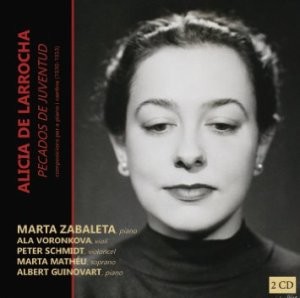Yes, it’s the same Alicia de Larrocha. Few knew that the 20th century’s foremost Spanish pianist wrote music. She started composing at age seven and continued on and off until her 30th year, with a prolific spurt in her late teens. Admittedly, she composed for her own private pleasure, mostly for family and friends, and not for public performance. While the pianist played down her creative efforts as sins of her youth, she didn’t entirely disown them, and allowed her family to decide whether or not to make these works available after her death.
The majority of pieces are solo-piano miniatures, along with eight songs, a Romance for Cello and Piano, and a three-movement Violin Sonata. Although the music’s ambitions are modest, every piece communicates charm and sincerity, not to mention Larrocha’s command of keyboard texture and excellent harmonic sense influenced in part by early- to mid-20th century Spanish piano music by Turina, Mompou, and Nin. Listen to Aiguablava’s disarming melodies and sophisticated manipulation of registral extremes, or to Burlesca’s rhythmic snap and suave chromatic sleights-of-hand, and you’ll understand what I mean.
Ten Inventions and a four-movement Suite from 1939, plus the 1941 Sonata antigua add up to delightful faux Scarlatti. Sandwiched between the Violin Sonata’s two bland outer movements is a gorgeous Adagio packed with harmonic intensity. It’s let down, however, by violinist Ala Voronkova’s ugly tone and wobbly vibrato. It’s the complete opposite of cellist Peter Schmidt’s elegance and control in the little Schumannesque Romanza. Marta Zabaleta does an admirable job with the solo piano selections, especially in slower, lyrical works. However, faster virtuosic fare would have benefited from more lightness and élan on the level of a pianist like…hmmm…let me see…Alicia de Larrocha.
For me, the songs represent Larrocha’s strongest compositions. I love the folksy tunefulness and neo-Gershwin chords in Canço d’un doble amor and Maite, and admire how the rippling extroversion of Hoy creo en Dios never becomes cloying. Inspiration flows freest when Larrocha lets her dark and brooding side emerge in the desolate Tal vida tal fin, and in Mi vida es un erial, where soprano Marta Mathéu gorgeously floats the long lines as if she never needs breath. Her lovingly characterized performances further stand out by virtue of Albert Guinovart’s world-class accompaniments. Indeed, Guinovart ought to have been recruited for some of the solo pieces; he’s an underrated artist whose terrific Harmonia Mundi solo CDs deserve serious attention.
The booklet notes couldn’t be more informative, and there are full texts and translations for the songs. Had the performances been uniformly consistent, I’d be able to recommend this release without qualification. At the very least, it’s worth it for the songs.
































